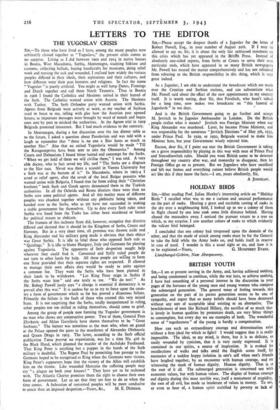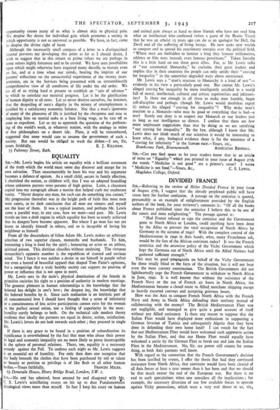BRITISH YOUTH
Sut,—I am at present serving in the Army, and, having achieved nothing, and being condemned to continue, while the war lasts, to achieve nothing, I have had something of a personal interest in the discussion in your pages of the fortunes of the young men and young women who compose the submerged generation. The general tenor of feeling towards this generation on the part of its parent generation seems to be one of sympathy, and regret that so many beliefs should have been destroyed without any sort of acceptable ideal existing as an alternative. The bewilderment of men like Richard Hillary, the sacrifice of so much that is lovely in human qualities by premature death, are very bitter things to contemplate, but every day we see examples of both. The wonderful sense of " togetherness " of the young is hardly a compensation.
How can such an extraordinary courage and determination exist without a firm ideal for which to fight? I would suggest that it is really impossible. The ideal, to my mind, is there, but it is so delicate, so easily wounded by cynicism, that it is very rarely expressed. It is contained in our spirits, a source of inspiration. It is evoked by recollections of walks and talks amid the English scene itself, by memories of a sudden happy isolation in one's self when one's friends have laughed together, by an encounter with human courage, and on witnessing the mark of human dignity. Human dignity. That is at the root of it all. The submerged generation is concerned not with economic values, but with human values. The display of human courage and dignity during this most terrible war, itself a monument of stupidity, the root of all evil, has made us intolerant of values in money. To see, or even to hear of, a human spirit stultified by poverty or lack of
opportunity causes many of us what is almost akin to physical pain. We despise the desire for individual gain which promotes a society in which opportunity is not as universal as possible. We have. in fact, come to despise the divine right of lucre.
Although the necessarily small compass of a letter to a distinguished journal prevents my developing this point as far as I should desire, I wish to suggest that in this return to prime values we are perhaps in some senses highly fortunate and to be envied. We have seen possibilities open which might otherwise have required many decades to mature even so 'far, and at a time when our minds, bearing the imprint of our parents' reflections on the unsuccessful experiment of the twenty years armistice, are in the Services being presented with an extraordinarily comprehensive view of all conditions of life under the old order. We are all of us trying hard at present to establish an " axis of advance " to which to correlate our material progress. Let it be the glorification of human dignity at all costs. Let us never deceive ourselves, for instance, that the despoiling of men's dignity in the misery of unemployment is justified by a satisfactory economic balance. Not that a man's ignorance of many of the pleasures of life is justified by the cheapness and ease ca employing him on menial tasks at a bare living wage, to be cast off as soon as expedient. Let us try to approach the question of the perform- ing of the world's work, at whatever station, with the analogy in- mina of five philosophers on a desert isle. Plato, it will be remembered, suggested that none- would care to assume the government of such a society. But one would be obliged to wash the dishes.—I am, Sir,



























 Previous page
Previous page